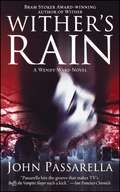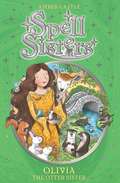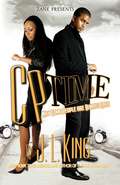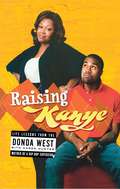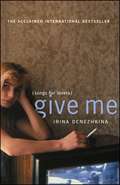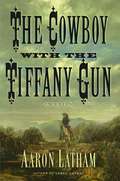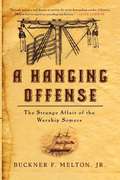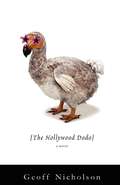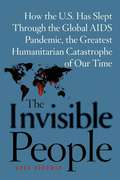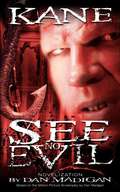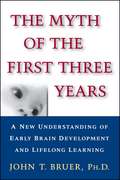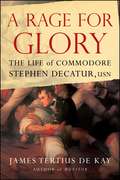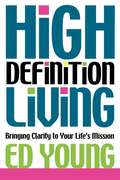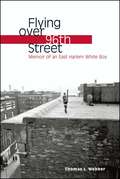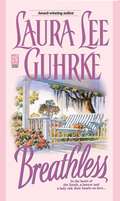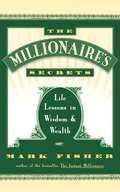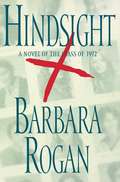- Table View
- List View
Wither's Rain
by John PassarellaOnce they were strangers bound by their fears of a demonic entity called Elizabeth Wither. They saw her come to life on Halloween in the historic college town of Windale, Massachusetts. They saw their dark dreams come true by the terror she wrought. They watched her crushing death in tons of falling stone. But if Wither is gone and their nightmares are over, why do they wake up screaming? Wendy Ward -- a college student with a gift for white magic -- can sense that the town of Windale is in for a dramatic change in weather. There's a new chill in the air....It's whispered in the warnings of an old woman. It's hidden in the corrupting legacy of a newborn baby. It's waiting in an ancient evil impatient for a human host. And it's being carried in the creeping flow of black blood -- Wither's rain.
Spell Sisters: Olivia The Otter Sister
by Amber CastleAn exciting new series for 7+ girls following a young Guinevere of Camelot in her quest to save the magical island of Avalon from evil Morgana Le Fay When eleven-year-old Gwen ventures into the forest beyond her castle home she comes across the magical island of Avalon and her life changes forever. The lady of the lake, Nineve, asks Gwen to embark on a quest to protect the enchanted island of Avalon from the evil sorceress Morgana Le Fay. Morgana has imprisoned the eight Spell sisters of Avalon throughout the kingdom and stolen their magical powers. It’s up to Gwen, her best friend Flora and a very special horse named Moonlight to find the sisters and return them to Avalon before its magic is lost forever. In their seventh adventure Gwen and her cousin Flora go in search of Olivia the sister who controls animals.
CP Time
by J. L. KingEveryone has a story of being the victim of CP time. It's been responsible for the termination of jobs and relationships, and for delaying weddings and even funerals. CP Time is the first book to examine a behavior that crosses all social economic lines within the black community in a way that will bring smiles and groans of recognition to victims and culprits alike. In brisk, engaging chapters, J.L. King provides humorous examples and personal stories, voicing the opinions of those who view habitual lateness as just part of being black, and those who see it as a more serious problem. Recounting the reasons and excuses offered in CP time's defense, King provides a wry and often hilarious history of how and why the phenomenon began. Light-hearted yet enlightening, CP Time makes a perfect gift for the chronically tardy -- and all those affected by them.
Raising Kanye: Life Lessons from the Mother of a Hip-hop Superstar
by Karen Hunter Donda West Kanye WestAs the mother of hip-hop superstar Kanye West, Donda West has watched her son grow from a brilliant baby boy with all the intimations of fame and fortune to one of the hottest rappers on the music scene. And she has every right to be proud: she raised her son with strong moral values, teaching him right from wrong and helping him become the man he is today. In Raising Kanye, Donda not only pays homage to her famous son but reflects on all the things she learned about being his mother along the way. Featuring never-before-seen photos and compelling personal anecdotes, Donda's powerful and inspiring memoir reveals everything from the difficulties she faced as a single mother in the African-American community to her later experiences as Kanye's manager as he rose to superstardom. Speaking frankly about her son's reputation as a "Mama's Boy," and his memorable public outbursts about gay rights and President George W. Bush, Donda supports her son without exception, and here she shares the invaluable wisdom she has taken away from each experience -- passion, tolerance, patience, and above all, always telling the truth. Ultimately, she not only expresses what her famously talented son has meant to her but what he has meant to music and an entire generation.
The Full Cleveland
by Terry Reed"When we were rich, we had no real use for the Easter Bunny." With trademark elegance and wit, Boyce Parkman, the young narrator of Terry Reed's smart, sexy novel, The Full Cleveland, begins the story that follows a privileged Shaker Heights family's dramatic reversal of fortune -- and an American girl's unforgettable coming-of-age. Bright, athletic, charming, the five Parkman children appear to be living the American dream in a beautiful house in a beautiful neighborhood. But as Boyce is transformed from a precocious ten-year-old into a passionate, idealistic young woman, she comes to see the dream as an illusion. Part of the problem is her parents. Dad, the Protestant, seems intent on nurturing his children with the noble ideals of an obsolete generation. He wants them to see great works of art and to witness the realities of life on the other side of the tracks, in the slums of inner-city Cleveland. Mother, the Catholic, is hell-bent on having her kids achieve something in life, and her method is to make them pray for it. Add the confusing influences of teenage life in a charmed world -- the gorgeous girls, the beautiful boys, the sudden friend: school genius, scholarship student, and bus driver's daughter. Finally Boyce has to find her own philosophical path through the turmoil of her adolescence and the unraveling of her family's fortunes. Her first real love, her first defiant act, her first glimpse of a universe outside her own all mark her as she navigates her way through comic detours and unexpected turns of fate. Here is an original voice that dazzles and delights, a heroine both fierce- hearted and funny, who sets out to find the true meaning of success. In the end, the fortune lost is seamlessly linked with childhood's passing, becoming a deft metaphor for the journey of everyman, and every girl. The Full Cleveland takes its place on the short shelf of great coming-of-age fiction.
Solace
by Mary SojournerNPR commentator Mary Sojourner, "a pithy yet sensuous, spiritual yet ferocious writer" (Booklist), delivers a powerful memoir about the joys of rejecting the pace, addictions, and false values of society...and learning to live without compromise. Twenty years ago, Mary Sojourner was a mental health consultant and counselor in Rochester, New York, a divorced mother of three, longing for her real work, her real home. She found it in Flagstaff, Arizona, in a remote two-room cabin that had no running water and only a wood stove for heat, but offered Sojourner everything she needed in terms of light, beauty, joy, and the perfect setting for writing and reconnecting. Solace is a book about obsession and release, and the lifelong search for balance in a world revolving around appetite and acceleration. Written in short, beautifully crafted pieces, the book carries the reader through Sojourner's life, from a restrained Catholic childhood to the excesses of her generation, through motherhood and divorce to her quiet, solitary existence in the Southwest, where she has learned the importance of living at the right pace. Sojourner's voice is as compelling on the page as it is on the radio -- lively, funny, moving, combining the outspoken out-of-stepness of Anne Lamott with the environmental activism and poetic prose of Terry Tempest Williams. In chapters with titles such as "God Is Coming and She Is Pissed" and "How to Leave: Leave," her vivid personality, passion, and sense of humor come through. This is a book for women everywhere -- those who recognize their own truths in Mary's life and younger readers who will find inspiration in her hard-won wisdom.
Give Me
by Irina DenezhkinaShortlisted for Russia's national bestseller prize and translated into twelve languages, Give Me marks the debut of a literary wunderkind, a gifted writer with a fine-tuned ear and unforgettable voice. The stories in Give Me are bracingly authentic and deeply felt -- vibrant snapshots colored by vodka, drugs, and young love that capture life at a certain age in a specific part of the world while reflecting the universal emotions of a generation. Too young to identify with life in the Soviet era, the frank, funny, appealingly tough characters in Give Me are forced to find their identities in the chaotic atmosphere of a country recovering from systemic collapse. They reach out to each other in ways that are sometimes affectionate, sometimes cruel, and always desperate for connection. A young soldier on leave from the Chechen war laments the meaninglessness of civilian life -- "all that goddamned self-expression" -- while his girlfriend ponders the elegant arch of her best friend's eyebrows; a teacher at a summer camp is appalled, disgusted, and frightened by her out-of-control charges and the retribution she could suffer at the hands of their powerful parents; love and loyalty become entangled as a young woman sleeps with friends of her unattainable object of desire to feel closer to him; a suicidal teenager finds salvation in the unlikely duo of a beefy security guard and his Rottweiler; the object of a university student's crush unknowingly pushes her buttons from afar when he neglects to return her anonymous love notes; and Death visits an Internet chat room after politely accepting the offer of a cup of tea. Full of electricity, humor, controversy, and above all, humanity, these pitch-perfect stories put to use the possibilities of language and perception to give a glimpse of Russia's youth and their struggle to grow up, find their way, and, ultimately, love.
The Cowboy with the Tiffany Gun
by Aaron LathamThe cowboy is the American knight, so it would follow that tales of knighthood can provide the inspiration for stories about cowboys and the basis for this grand and dazzlingly innovative epic of the old American West by the celebrated author and screenwriter of Urban Cowboy. Inspired by Sir Percival's great quest for the Holy Grail, Aaron Latham has crafted a classic adventure story set among the tumbleweeds of the American West at the twilight of the nineteenth century. It is first and foremost the coming-of-age story of an innocent -- a fledgling cowboy, that singularly American update on the archetypal knight of old. Featuring characters from Latham's acclaimed Code of the West, The Cowboy with the Tiffany Gun is his most exhilarating performance yet. Our young hero is Percy -- but he prefers his nickname, Pyg, short for Percy York Goodnight. When he learns that the man called Loving has been shot and is near death, Percy and his mother, Revelie, rush away to be by Loving's side in Texas. Long ago, Revelie shared with Loving a bond of great passion. Mother and son arrive to find Loving gravely ill -- and to discover that an heirloom ax has disappeared from the ranch. According to Western lore, this was the very ax that Jimmy Goodnight, Percy's presumed father, once pulled out of an anvil. The ax was stolen from the cemetery, where it had been imbedded in Goodnight's tombstone. The stone is gone, too. Latham's historically authentic narrative takes off on a rousing gallop here as Pyg vows to find the ax and must face trials and calamities of a Biblical scale -- flood, fire, gunfights, and the devastating pestilence that changed the course of frontier history. Of Code of the West, James M. McPherson wrote that "Latham has pulled off the seemingly impossible." With The Cowboy with the Tiffany Gun, he has done it again.
A Hanging Offense
by Buckner MeltonMutiny on the Bounty is one of history's greatest naval stories -- yet few know the similar tale from America's own fledgling navy in the dying days of the Age of Sail, a tale of mutiny and death at sea on an American warship. In 1842, the brig-of-war Somers set out on a training cruise for apprentice seamen, commanded by rising star Alexander Mackenzie. Somers was crammed with teenagers. Among them was Acting Midshipman Philip Spencer, a disturbed youth and a son of the U.S. Secretary of War. Buying other crew members' loyalty with pilfered tobacco and alcohol, Spencer dreamed up a scheme to kill the officers and turn Somers into a pirate ship. In the isolated world of a warship, a single man can threaten the crew's discipline and the captain's authority. But one of Spencer's followers warned Mackenzie, who arrested the midshipman and chained him and other ringleaders to the quarterdeck. Fearing efforts to rescue the prisoners, officers had to stay awake in round-the-clock watches. Steering desperately for land, sleep-deprived and armed to the teeth, battling efforts to liberate Spencer, Somers's captain and officers finally faced a fateful choice: somehow keep control of the vessel until reaching port -- still hundreds of miles away -- or hang the midshipman and his two leading henchmen before the boys could take over the ship. The results shook the nation. A naval investigation of the affair turned into a court-martial and a state trial and led to the founding of the Naval Academy to provide better officers for the still-young republic. Mackenzie's controversial decision may have inspired Herman Melville's great work Billy Budd. The story of Somers raises timeless questions still disturbing in twenty-first-century America: the relationship between civil and military law, the hazy line between peace and war, the battle between individual rights and national security, and the ultimate challenge of command at sea.
The Hollywood Dodo
by Geoff NicholsonFrom the critically acclaimed author of The Food Chain and Footsucker comes a sophisticated comedy about three people caught in the Hollywood machine. Following the death of his wife, Henry Cadwallader, an English doctor, insists on accompanying his aspiring actress daughter, Dorothy, on a trip to Hollywood. He fears she will fall prey to corruption and sleaze, but finds that it is actually he who is being corrupted at every turn.
The Prostate Health Program
by Max Gomez Daniel Nixon The Reference WorksWhat foods should you eat if you want to keep your prostate healthy? How does sexual activity affect the health of your prostate? What are ways you can prevent prostate cancer? What should African-American men know about prostate cancer? What are the best alternatives to radiation and surgery in treating prostate cancer? What are the symptoms of an unhealthy prostate? These are some of the many important questions that are answered by Dr. Daniel W. Nixon, one of America's premier cancer research institute leaders, and Dr. Max Gomez, the charismatic health commentator whose reports are aired on NBC television stations nationwide. The authors not only provide indispensable guidance in cancer prevention but also offer a dynamic, new noninvasive treatment of prostate cancer. Packed with information, The Prostate Health Program explains in clear, simple language the link between obesity and prostate cancer, the difference between an enlarged prostate and a diseased one, the causes of frequent urination and pain, and the specific prostate problems pertaining to gay men. Drs. Nixon and Gomez offer a user-friendly plan of diet, exercise, and behavioral change that men can easily incorporate into their lives. The authors explain why aggressive treatment, such as radiation and surgery, is often unnecessary, less effective, and more dangerous -- often leaving men incontinent and impotent -- than other treatments. The cornerstones of this unique program are the Prostate Health Pyramid and the Transition Diet, both of which were created specifically for this book and are the ultimate tools in prostate cancer prevention, control, and treatment. First, the foods that protect the health of the prostate are identified; then, food changes are introduced slowly for more effective and long-lasting reform of eating habits. Best of all, quick and easy recipes created by chefs at the Culinary Institute of America provide a menu that is healthy and delicious. With its combination of cutting-edge research and highly respected, world- renowned authors, The Prostate Health Program is the definitive defense against a deadly disease.
The Invisible People: How the U.S. Has Slept Through the Global AIDS Pandemic, The Greatest Human Catastrophe of Our Time
by Greg BehrmanThe Invisible People is a revealing and at times shocking look inside the United States's response to one of the greatest catastrophes the world has ever known -- the global AIDS crisis. A true story of politics, bureaucracy, disease, internecine warfare, and negligence, it illustrates that while the pandemic constitutes a profound threat to U.S. economic and security interests, at every turn the United States has failed to act in the face of this pernicious menace. During the past twenty years, more than 65 million people across the globe have become infected with HIV. Already 25 million around the world have died -- more than all of the battle deaths in the twentieth century combined. By decade's end there will be an estimated 25 million AIDS orphans. If trends continue, by 2025, 250 million global HIV-AIDS cases are a distinct possibility. Beyond the ineffable human toll, the pandemic is reshaping the social, economic, and geopolitical dimensions of our world. Eviscerating national economies, creating an entire generation of orphans, and destroying military capacity, the disease is generating pressures that will lead to instability and possibly even state failure and collapse in sub-Saharan Africa. Poised to explode in Eastern Europe, Russia, India, and China, AIDS will have devastating and destabilizing effects of untold proportions that will reverberate throughout the global economy and the international political order. In this gripping account that draws on more than two hundred interviews with key political insiders, policy makers, and thinkers, Greg Behrman chronicles the red tape, colossal blunders, monumental egos, power plays, and human pain and suffering that comprise America's woeful response to the AIDS crisis. Behrman's unprecedented access takes you inside the halls of power from seminal White House meetings to tumultuous turf battles at World Health Organization headquarters in Geneva, heated debates in the United Nations, and chilling discoveries at the Centers for Disease Control. Behrman also brings us into the field to meet the people who live in the midst of AIDS devastation in places like a school yard in Namibia, the red-light district in Bombay, and an orphanage in South Africa. Intensely researched and vividly detailed, The Invisible People is a groundbreaking and compellingly readable account of the appalling destruction caused by more than two decades of American abdication in the face of the defining humanitarian catastrophe of our time.
See No Evil
by Dan MadiganHe's the last thing you'll ever see... Seven-feet-tall. Four hundred pounds. A blood-crusted, rusty steel plate screwed into his skull. But perhaps the most terrifying thing about reclusive psychopath Jacob Goodnight are the razor-sharp nails on his forefingers, the ones that circle around his victims' eyes just before he takes them. Holed up within the long-abandoned Blackwell Hotel, nine floors of hidden passageways and two-way mirrors that once acted as a playground for the rich and privileged, Jacob's disturbing gaze is now fixed on Kira, Christine, Michael, Tye, Zoe, Melissa, Richie, and Russell -- eight delinquents hoping to shave time off their county jail sentences by performing community service and restoring the building -- and detention officer Frank Williams, the former cop who put a bullet in Jacob's head four years prior. Goodnight sees the sins in their eyes -- he always does -- and he's going to pluck them out, one by one... See No Evil, a violent, bloody account of madness and revenge, is a novelization of the terrifying new thriller from WWE Films and Lionsgate, starring WWE Raw Superstar Kane.
The Myth of the First Three Years
by John BruerMost parents today have accepted the message that the first three years of a baby's life determine whether or not the child will grow into a successful, thinking person. But is this powerful warning true? Do all the doors shut if baby's brain doesn't get just the right amount of stimulation during the first three years of life? Have discoveries from the new brain science really proved that parents are wholly responsible for their child's intellectual successes and failures alike? Are parents losing the "brain wars"? No, argues national expert John Bruer. In The Myth of the First Three Years he offers parents new hope by debunking our most popular beliefs about the all-or-nothing effects of early experience on a child's brain and development. Challenging the prevailing myth -- heralded by the national media, Head Start, and the White House -- that the most crucial brain development occurs between birth and age three, Bruer explains why relying on the zero to three standard threatens a child's mental and emotional well-being far more than missing a few sessions of toddler gymnastics. Too many parents, educators, and government funding agencies, he says, see these years as our main opportunity to shape a child's future. Bruer agrees that valid scientific studies do support the existence of critical periods in brain development, but he painstakingly shows that these same brain studies prove that learning and cognitive development occur throughout childhood and, indeed, one's entire life. Making hard science comprehensible for all readers, Bruer marshals the neurological and psychological evidence to show that children and adults have been hardwired for lifelong learning. Parents have been sold a bill of goods that is highly destructive because it overemphasizes infant and toddler nurturing to the detriment of long-term parental and educational responsibilities. The Myth of the First Three Years is a bold and controversial book because it urges parents and decision-makers alike to consider and debate for themselves the evidence for lifelong learning opportunities. But more than anything, this book spreads a message of hope: while there are no quick fixes, conscientious parents and committed educators can make a difference in every child's life, from infancy through childhood, and beyond.
A Rage for Glory
by James Tertius de KayStephen Decatur was one of the most awe-inspiring officers of the entire Age of Fighting Sail. A real-life American naval hero in the early nineteenth century, he led an astonishing life, and his remarkable acts of courage in combat made him one of the most celebrated figures of his era. Decatur's dazzling exploits in the Barbary Wars propelled him to national prominence at the age of twenty-five. His dramatic capture of HMSMacedonianin the War of 1812, and his subsequent naval and diplomatic triumphs ...
High Definition Living
by Ed YoungWhether you're a stay-at-home mom, a business executive, or a visible leader in your church, this book will give you a clear picture of how you can fulfill God's mission for your life. Drawing on concepts learned from the Old Testament prophet Nehemiah, author Ed Young shares high-definition principles for everyone who wants to live a life of super clarity as a follower of Christ. God intends that every follower of His be a leader of others. Young is not primarily talking about the kind of leadership that puts you in front of large crowds or has you directing huge projects. He's talking about making a difference for God as you impact others for His Kingdom -- wherever you are, whoever you are.
Flying over 96th Street: Memoir of an East Harlem White Boy
by Thomas WebberWebber's lyrical memoir of growing up white in East Harlem's public housing projects in the late 1950s and 1960s explores racial identity and community at the height of the civil rights movement.
Night and Day
by John LeslieGideon Lowry, a piano-playing private eye from Key West, locates the husband of a sexy MTV star but cannot stop his murder. When police then accuse his friend of the killing, Lowry investigates.
Breathless
by Laura Lee GuhrkeAward-winning author Laura Lee Guhrke steps back to a time of Southern propriety -- and passion -- in this thrilling page-turner laced with heated sensuality. A lawyer is reunited with an unforgettable lady from his past -- and together, they step into a web of small-town scandal and desire. Lily Morgan may be Shivaree, Georgia's most talked-about lady. Everyone in town knows about the bitter break-up of her marriage five years before, when Daniel Walker, her husband's tough, uncompromising lawyer, tore her reputation to shreds and left her with nothing but a wish to get even. But now something about Daniel makes her blood boil and her pulse quicken...not with righteous fury, but with passion. Daniel has returned to Shivaree to once again match wits with Lily Morgan. The thought of a rematch with Lily delights him, for he has never forgotten her hot temper -- or her lovely looks. But when a shocking murder shakes the town, Daniel joins Lily to find a killer, and their unexpected partnership sparks something between them that they never expected -- desire. Now Daniel, the strong-willed lawyer for whom winning is everything, realizes he must win the one reward he can't live without: Lily's forgiveness -- and her love.
The Millionaire's Secrets: Life Lessons in Wisdom and Wealth
by Mark FisherMark Fisher, author of The Instant Millionaire and an instant millionaire himself, returns to share more of his simple wisdom in this powerful parable about a struggling advertising executive who encounters an eccentric but wise millionaire whose mysterious words and probing questions open the door to financial prosperity and a rich, fulfilling life.
Hindsight
by Barbara RoganThe New York Times calls Barbara Rogan "a passionate writer whose prose is as vivid as lightning bolts." Now she delivers a mesmerizing tale of a long-hidden betrayal -- and its deadly repercussions. In the summer of 1972, on the night of their high school graduation, nine friends make a solemn vow to meet in twenty years' time. For Willa Scott, flanked by her best friend, Angel, and her boyfriend, Caleb, the future is a canvas to be painted in bold strokes and bright colors. But the ensuing decades bring change and separation. Willa becomes a biographer, and she drifts away from Caleb and Angel. Almost twenty years later, Willa, now mother of a teenage girl herself and recently widowed, looks up during a book signing and sees Patrick Mulhaven, the bad boy of Beacon High. He reminds her of their long-ago vow and persuades her to help track down their old group. It isn't long before Willa discovers that Angel's trail after high school is ice cold. It's as if she dropped off the face of the earth. Convinced that something has happened to her friend, Willa begins a search that takes her back through the looking glass. What she thought were the idyllic friendships of her youth are revealed as a tangled web of deception, betrayal, and life-shattering secrets. As the reunion weekend approaches, Willa is convinced that someone has killed -- and will kill again -- to keep Angel's whereabouts hidden forever. But when the people you know best are the people you know least, who can you trust? Barbara Rogan has proven herself a master of subtly evolving fear, and Hindsight delivers a spellbinding story about the powerful -- and sometimes murderous -- yearnings of the human heart.
The Cambridge Companion to Nietzsche
by Kathleen M. Higgins Bernd MagnusThe significance of Friedrich Nietzsche for twentieth century culture is now no longer a matter of dispute. He was quite simply one of the most influential of modern thinkers. The opening essay of this 1996 Companion provides a chronologically organised introduction to and summary of Nietzsche's published works, while also providing an overview of their basic themes and concerns. It is followed by three essays on the appropriation and misappropriation of his writings, and a group of essays exploring the nature of Nietzsche's philosophy and its relation to the modern and post-modern world. The final contributions consider Nietzsche's influence on the twentieth century in Europe, the USA, and Asia. New readers and non-specialists will find this the most convenient, accessible guide to Nietzsche currently available. Advanced students and specialists will find a conspectus of recent developments in the interpretation of Nietzsche.
The Cambridge Companion to Leibniz
by Nicholas JolleyA remarkable thinker, Gottfried Leibniz made fundamental contributions not only to philosophy, but also to the development of modern mathematics and science. At the center of Leibniz's philosophy stands his metaphysics, an ambitious attempt to discover the nature of reality through the use of unaided reason. This volume provides a systematic and comprehensive account of the full range of Leibniz's thought, exploring the metaphysics in detail and showing its subtle and complex relationship to his views on logic, language, physics, and theology.
The Cambridge Companion to Hegel
by Frederick C. BeiserFew thinkers are more controversial in the history of philosophy than Hegel. He has been dismissed as a charlatan and obscurantist, but also praised as one of the greatest thinkers in modern philosophy. No one interested in philosophy can afford to ignore him. This volume considers all the major aspects of Hegel's work: epistemology, logic, ethics, political philosophy, aesthetics, philosophy of history, philosophy of religion. Special attention is devoted to problems in the interpretation of Hegel: the unity of the Phenomenology of Spirit; the value of the dialectical method; the status of his logic; the nature of his politics. A final group of chapters treats Hegel's complex historical legacy: the development of Hegelianism and its growth into a left and right wing school; the relation of Hegel and Marx; and the subtle connections between Hegel and contemporary analytic philosophy.
The Cambridge Companion to Locke
by Vere ChappellThe essays in this volume provide a systematic survey of Locke's philosophy informed by the most recent scholarship. They cover Locke's theory of ideas, his philosophies of body, mind, language, and religion, his theory of knowledge, his ethics, and his political philosophy. There are also chapters on Locke's life and subsequent influence. New readers and nonspecialists will find this the most convenient, accessible guide to Locke currently available.
